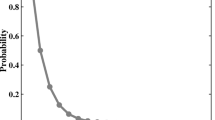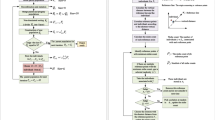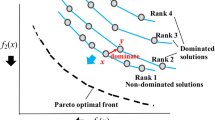Abstract
In this paper, the diversity information included by dominating number is analyzed, and the probabilistic relationship between dominating number and diversity in the space of objective function is proved. A ranking method based on dominating number is proposed to build the Pareto front. Without increasing basic Pareto method’s computation complexity and introducing new parameters, a new multiobjective genetic algorithm based on proposed ranking method (MOGA-DN) is presented. Simulation results on function optimization and parameters optimization of control system verify the efficiency of MOGA-DN.
Similar content being viewed by others

References
C. A. Coello Coello, D. A. Van Veldhuizen, G. B. Lamont. Evolutionary Algorithms for Solving Multiobjective Problems[M]. New York: Kluwer Academic Publishers, 2002.
C. A. Coello Coello. Evolutionary multiobjective optimizations: A historical view of the field[J]. IEEE Computational Intelligence Magazine, 2006, 1(1): 28–36.
T. Goel, R. Vaidyanathan, R. T. Haftka, et al. Response surface approximation of Pareto optimal front in multiobjective optimization[J]. Computer Methods in Applied Mechanics and Engineering, 2007, 196(4): 879–893.
S. L. Ho, S. Yang, G. Ni. Incorporating a priori preferences in a vector PSO algorithm to find arbitrary fractions of the pareto front of multiobjective design problems[J]. IEEE Transactions on Magnetics, 2008, 44(6): 1038–1041.
T. Back. Evolutionary Algorithms in Theory and Practice[M]. New York: Oxford University Press, 1996.
H. Tamak, H. Kita, S. Kobayashi. Multiobjective optimization by genetic algorithms: A review[C]//Proceedings of IEEE International Conference on Evolutionary Computation. New York: IEEE, 1996: 517–522.
D. E. Goldberg. Genetic Algorithms in Search, Optimization, and Machine Learning[M]. Boston: Addison Wesley Longman Publisher, 1989.
A. Dietz, C. Azzaro-Pantel, L. Pibouleau, et al. Strategies for multiobjective genetic algorithm development: application to optimal batch plant design in process systems engineering[J]. Computers & Industrial Engineering, 2008, 54(3): 539–569.
D. Sarkar, J. M. Modak. Pareto-optimal solutions for multiobjective optimization of fed-batch bioreactors using non-dominated sorting genetic algorithm[J]. Chemical Engineering Science, 2005, 60(2): 481–492.
C. A. Coello Coello, E. M. Montes. Constraint-handling in genetic algorithm through the use of dominance-based tournament selection[J]. Advanced Engineering Informatics, 2002, 16(3): 193–203.
F. Aherne, P. Rockett, N. Thacker. Automatic parameter selection for object recognition using a parallel multiobjective genetic algorithm[C]//The 7th International Conference on Computer Analysis of Images and Patterns. Berlin: Springer-Verlag, 1997: 559–566.
E. Zitzler, L. Thiele. Multiobjective evolutionary algorithms: A comparative case study and the strength pareto approach[J]. IEEE Transactions on Evolutionary Computation, 1999, 3(4): 257–271.
J. Branke, B. Scheckenbach, M. Stein, et al. Portfolio optimization with an envelope-based multiobjective evolutionary algorithm[J]. European Journal of Operational Research, 2009, 199(3): 684–693.
T. Marlin. Process Control: Designing Processes and Control System for Dynamic Performance[M]. New York: McGraw-Hill, Inc. 1995.
C. R. Cutler, B. L. Ramaker. Dynamic matrix control: a computer control algorithm[C]//Proceedings of Joint Automatic Control Conference. New York: IEEE, 1980.
Author information
Authors and Affiliations
Corresponding author
Additional information
The work was supported by the Academic Outstanding Youth Talented Person Fund of Anhui Province (No.2009SQR2014).
Wei CHEN is a lecturer at the Hefei University of Technology, Anhui Province, China. She obtains her bachelor of Engineering and her Ph.D. of Engineering from University of Science and Technology of China. A major area of her research is focused on nonlinear model predictive control, and a secondary area of her research is concerned with artificial intelligence, particularly genetic algorithm and the corresponding application.
Jingyu YAN is a Ph.D. candidate in the Department of Mechanical and Automation Engineering, the Chinese University of Hong Kong. He obtains his bachelor and master degrees of Engineering from University of Science and Technology of China. His current research interests are biomedical engineering, process control and optimization, and nonlinear model predictive control based on soft computing.
Mei CHEN is an associate professor at the Hefei University of Technology, Anhui Province, China. Her major research area is focused on computer control.
Xin LI is a lecturer at the Hefei University of Technology, Anhui Province, China. His major research area is focused on control strategies on power electronics and intelligent control.
Rights and permissions
About this article
Cite this article
Chen, W., Yan, J., Chen, M. et al. Diversity of Pareto front: A multiobjective genetic algorithm based on dominating information. J. Control Theory Appl. 8, 222–228 (2010). https://doi.org/10.1007/s11768-010-7222-3
Received:
Accepted:
Published:
Issue Date:
DOI: https://doi.org/10.1007/s11768-010-7222-3



